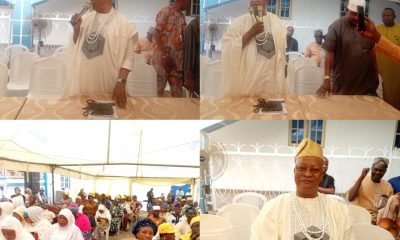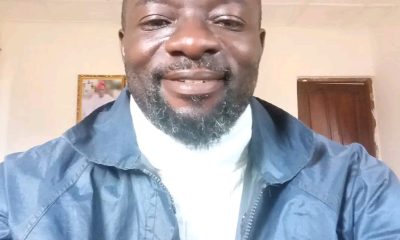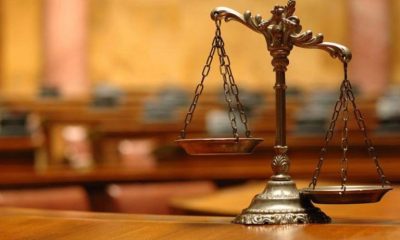News
2023: Don’t Bow To Pressure Of Shifting Electoral Timetable, Jega Tells INEC

Former Chairman of the Independent National Electoral Commission, INEC, Professor Attahiru Jega, Wednesday, advised the INEC boss, Prof. Mahmood Yakubu, not to give-in to the pressures from political parties to adjust the electoral timetable.
The former boss who stated this, in Abuja, during a one-way colloquium on: emerging issues that will shape the 2023 general election in Nigeria, said that one of the repercussions of bowing to the pressure of modifying the electoral timetable, would serve as a recipe to electoral disaster.
Jega, while stating that enough time had been given to all political parties to work within the framework given issued by INEC, said that shifting the electoral timetable would have a ripple effect on the electoral process.
His words: “I commend INEC for refusing to yield to the pressure of political parties to change the timetable for elections. The timetable was set up under a process of very careful contemplation and with the context of the new electoral law and shifting times tables is a recipe for electoral disaster because when you shift it, it will eventually affect the others.
“So, frankly, I think political parties have had the opportunity to work within the timelines provided by INEC. They have since February been able to do all that is required leading to the primary but because of this mentality of impunity they always assume that even at the last minute they can out pressure on INEC to use yield.
“INEC should never yield to this kind of pressure and we will also expect that if INEC refuses to change the timeline of the election because of pressure by political parties we do not expect INEC itself to also change timetable in its own favour. So, it means once the electoral commission, the politicians and all stakeholders must work together within the timetable and I believe that can lead to us having a desired credible election.
“If you change the time for primaries, it will affect everything. You will have to keep on adjusting and adjusting and you will lose trust and confidence and may affect the actual outcome of the election.”
On the issue of money politics, Jega noted that: “The use of money in Nigerian politics is a big issue of concern, rather than having improvements in that regard, it seems to be sliding back.
“Frankly, the way money is used, many of us are now saying that we are moving in the direction of becoming a plutocracy. Rather than a democracy. Plutocracy is basically the government of the rich for the rich by the rich.
“Imagine the National Assembly altered the Electoral Act to increase the threshold of how much a candidate can spend for election finance.
“That is something that we should all have opposed, regrettably, we were too busy opposing the issue of electronic transmission and so on that we lost focus we didn’t pay sufficient attention to what they were trying to do because they now smuggled the issue of huge financial outlays required of candidates and then in addition to that many political parties, especially the so called big ones, now put huge amounts as nomination fees, which excluded women excluded, young men excluded people with disability, and that is even at the level of entrance, people who want to contest so you can’t even run contests because they’ve made it so difficult for people to contest and then they will now come and also use a lot of money for the election.
“So it’s unfortunate. This is one area where attention has to be focused in the next cycle of electoral reform reforms to the electron legal framework. We have to make elections less and less and less costly.
“Because otherwise, you exclude people, you will make it only a field for the rich, you know, under the outcome, obviously, because we know in Nigeria, the rich befriends political offices as a profitable ventures.”
Earlier, the Chairman of INEC, Professor Mahmood Yakubu, promised to advance the electoral process by massively engaging field staff during of the 2023 general elections.
“We are going to engage field staff because they make elections thick. So, we are going to engage full time and be more field oriented immediately after the Osun election so that we engage the critical field staff of the commission to understand all these new, beautiful policies”, he said.
On her part, the Director, Center for Democracy and Development, CDD, Idayat Hassan, said that the 2023 general elections, which is the 7th in the nation’s history, should be taken seriously as “every election is more important than the last.”
She said: “This is mainly because the issues and themes that affect us are more recent than before. In a developing democracy like Nigeria, this is not just the decision of choosing our leaders, it also involves the electoral process. It includes the effective organisation of elections, the communication of results, the coverage of the process and the general acknowledgment that credible elections were carried out.
“It is why, more than ever before, it is important to bring together stakeholders that are actively involved in the planning of the elections to strategize and see how we can effectively work together to ensure the polls are successfully carried out.
“This is an election of importance, being the 7th election to be conducted in the fourth republic and even without an incumbent running, a brand new electoral act, with over 85 million registered voters expected to rise to 90million hopefully to vote people into the 1491 electable positions up for grabs.”
-

 Crime5 days ago
Crime5 days agoVigilante Reportedly Shoots Colleague Dead In Plateau
-

 News3 days ago
News3 days agoRamadan: Osun Cleric Urges Compassion Among Muslims As Asejere Distributes Relief Materials To 537 Beneficiaries
-

 News2 days ago
News2 days agoOkemesi Dies After Slipping Into Coma
-

 Crime3 days ago
Crime3 days agoCourt Commits Man To Life Imprisonment For Kidnapping Judge

